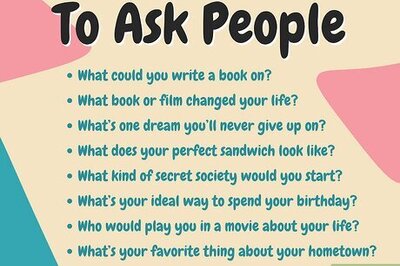
views
CHENNAI: If you like numbers, here’s an interesting one for you — 20,14,80,00,000. If trying to figure out how to say that out loud puts you to sleep, don’t be surprised; that’s approximately the number of hours that Greater Chennai sleeps every year. So does that make us a very sleepy city? Not at all, say sleep experts. In fact, people need at least one more hour to keep themselves fit and well-slept, it seems. While this number approximately tends to the 9.24 million people living in Chennai and its suburbs, who get at least six hours of sleep every night, at least one more hour every night is needed. “They say six hours is adequate for an adult whereas a child can sleep up to 12 hours, but people who ensure they have about seven hours are generally better equipped for work, when they wake up,” says Dr Suresh Kumar of the Adyar Sleep Disorders Centre. But if you’re in the older bracket of 40 years of age upward, or below 12, this loss of sleep really cannot be attributed to your ‘age group’. Most often, teens and young adults are the ones who have been susceptible to running for weeks with little to no sleep and actually making a habit out of it, “It’s the bane of digitisation,” rues Dr Suresh. “Social networking, mobile communication and lifestyle changes have made teens believe that adopting a lesser sleep pattern is all right as long as you can get up and function. This will not last for long,” he adds. Apparently, studies have shown that if you keep skipping sleep you incur a ‘sleep debt’, the results of which will show in two weeks. “Your performance goes down in two weeks — attention span, memory recall and learning take a hit,” warns the sleep specialist.In a country where 35 per cent of the population have admitted that they don’t get enough sleep and 30-45 per cent have shown definite signs of insomnia, sleep disorders aren’t really uncommon. “What is really uncommon is the knowledge that people have sleep related disorders. It’s not something to ignore if you have a habit of not being able to sleep or if you snore regularly,” adds Dr Suresh, who is also a member of the World Association of Sleep Medicine. He adds, “We have found that in urban settings, a lot of highly educated people have also been known to ignore symptoms of sleep issues.” Foremost on sleep physicians minds is controlling a condition known as ‘Obstructive Sleep Apnea’, which is related to a drop in oxygen intake when a person breathes during sleep. “We have found that in Chennai the prevalence is around 6-10 per cent and more people need to spot the signs,” he also says. And in case you’re wondering why these details did not make it in time for World Sleep Day, observed on March 16, the truth is, we fell asleep too.
















Comments
0 comment